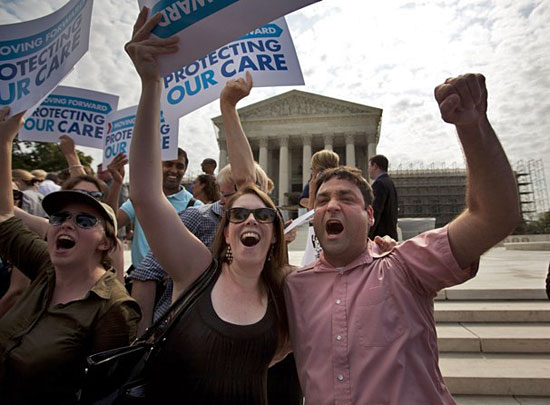Upholding rights—and health
June 28, 2012

Cheers erupted at the Supreme Court after the justices released their ruling upholding the healthcare act.
The U.S. Supreme Court today issued a ruling that will rank among its most historic—a decision that, like those others, will echo through the decades because it’s about more than the letter of the law. It’s about essential human rights and decency.
The high court’s decision to uphold the Affordable Care Act will, quite literally, save lives—both from illness and the financial ruin that can often follow. The court’s ruling is a resounding affirmation that access to affordable, quality health care isn’t a privilege, but a right.
The impact of the Supreme Court’s ruling will be felt more profoundly here in Los Angeles County than almost anywhere in the nation.
More than 2 million of our fellow residents have no health insurance, a gaping hole in the safety net that unfairly affects the quality of their lives and the lives of those around them. Our schools, streets and workplaces are less healthy when fewer of us can afford health care. And when our strained public hospitals and clinics fill with the indigent and uninsured, the tax burden falls on the rest of us.
That’s why, for the past two years, Los Angles County has worked so hard to prepare for the federal heath care law, which according to a UCLA analysis, would provide access to coverage for some 80% of the county’s uninsured population when it goes into full effect in 2014.
One provision promises to provide 750,000 county residents with access to insurance through a new state exchange that was upheld by the court’s action on Thursday. Another, allowing states to expand Medicaid access (or Medi-Cal, as we call it in California), would provide coverage to more than 1 million county residents. Although the Supreme Court gave states the right to opt out of that expansion, I would hope that our state leaders would seize the moment and take advantage of this opportunity to protect our greatest asset—the people of California.
Already, Los Angeles County’s Department of Health Services has enrolled some 200,000 low-income county residents into Healthy Way L.A., the Medi-Cal-like program we’ve created, with support from the federal government, as a bridge to the new law. Beginning January 1, 2014, the federal government will underwrite 100 percent of the costs of that program for several years, eventually dropping to 90 percent.
For us, the Affordable Care Act also is about more than future results. As a result of the law, tens of millions of dollars in federal funds already have begun flowing to local community clinics and to grants for anti-obesity and anti-tobacco initiatives, such as Choose Health L.A. These crucial undertakings are no longer at risk, thanks to the Supreme Court decision.
The law, of course, will not instantly fix a problem so entrenched in our society. Some low-income residents will choose not to purchase insurance through the state exchanges. Others will be ineligible for public programs because of their citizenship status. Thus, the county—and its clinics and hospitals—will remain crucial to hundreds of thousands of people.
What’s more, while the legalities may now be settled, the politics of health care reform clearly are far from over in this election year. However, at the end of the day the court’s decision puts people first. We are the only industrialized nation that does not insure all of its citizens, and it’s high time we remove that blemish. As we move forward, I hope we can look beyond the partisanship and remember that this debate is not about blue and red, but about life and death.
Posted 6/28/12












 405 bridge work causes a stink
405 bridge work causes a stink





